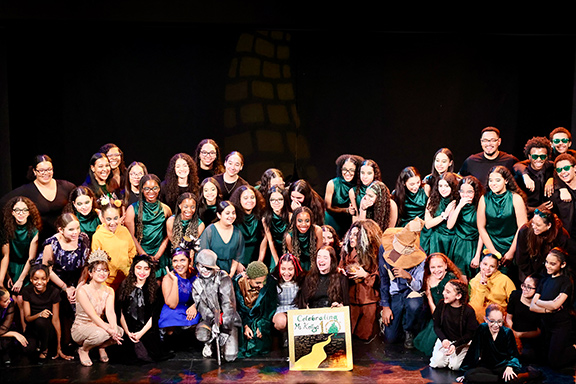Cornelia Connelly Center
Connelly Middle School
New York, NY

Jorge Garcia, Science Teacher and Athletic Director
Art in education is central to the Holy Child Network of Schools. Cornelia Connelly was an artist herself who saw all forms of artistic endeavors as invitations to experience the wonder, beauty and love of God. With that legacy in mind, we appreciate the uniqueness of each student’s talents displayed in this year’s musical!
Last week, our students debuted our annual musical, The Wiz at the Connelly Center Theater! This production marks a milestone for Kelly Ortiz, Musical Director for Grand Street Settlement’s Manhattan sites, as her tenth musical.
Originally debuting at the Majestic Theater on January 5, 1975, The Wiz ran for four years, winning seven Tony Awards, including Best Musical. It paved the road for Gregory Maguire’s 1995 novel Wicked: The Life and Times of the Wicked Witch of the West which led to the musical and the 2024 movie. With an all-Black cast, it became a Broadway milestone, inspiring revivals worldwide, a 1978 film, and the 2024 Broadway revival at the Marquis Theater—celebrating its 50th anniversary this year.
Ms. Kelly, known for her dedication to arts education in the Lower East Side, serves as the Ed. Specialist at Grand Street Settlement and Dance & Drama Teacher at the Connelly Center. A graduate of LaGuardia High School and SUNY Albany, she has directed for 11 years, collaborating with six schools and over 300 students. Her recent productions, In The Heights and The Wiz, were culturally significant productions that elevated the voices of women and people of color in the arts.
The Wiz was the most ambitious youth-led musical at the Connelly Center Theater. Through partnership with Broadway For Arts Education, former students and Grand Street Settlement crew were able to rig professional lights and sound, bringing this dream to life.
“For the Poetry of the Art we must provide various occasions to allow every grade in the school to cultivate their fancy and taste” -Cornelia Connelly
|